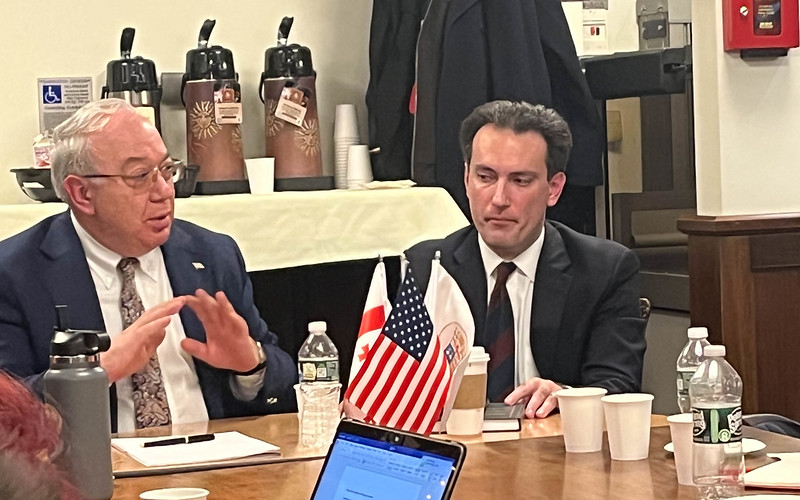
University Diplomacy and Conflict in Georgia
By Hannah Campeanu, MALD 2024 Candidate, The Fletcher School
On November 28, 2022, the Russia and Eurasia program hosted a conversation with Zurab Khonelidze, rector of Sokhumi State University in Tbilisi, Georgia. Professors Eileen Babbitt, Diana Chigas, and Alan Henrikson joined the exchange, given their longtime engagement in conflict and public diplomacy.
Sokhumi State University was originally based in Sokhumi in Abkhazia, which is currently under Russian occupation along with 20 percent of Georgia’s internationally recognized territory. The school moved to the Georgian capital of Tbilisi in 1993 after the war in Abkhazia. Most of SSU’s students and faculty are from Abkhazia, and the school has strived to be an intellectual bridge connecting back to Sokhumi, leveraging the power of informal Track II diplomacy.
Khonelidze brought his concept of “university diplomacy” to Fletcher, in which universities play a significant role in non-governmental diplomacy between state and non-state actors. In his concept of a “Georgian Paradigm of Peace,” Khonelidze discussed Georgia’s significant role in South Caucasus conflict management. He envisions Georgia as a hub and platform for essential peace and conflict discussions, where the United States would be able to engage with regional powers. He encourages increased university diplomacy as part of this paradigm.
As the former Georgian Ambassador to the Russian-led Commonwealth of Independent States (CIS) and the head of the diplomatic mission of Georgia to Belarus, Khonelidze has first-hand experience with Georgia’s territorial conflicts with Russia since the early 1990s. Georgia withdrew from the CIS soon after Russia’s invasion.
Khonelidze recalled some key moments from the Abkhazia conflict in 1992-93, saying, “The conflict in Abkhazia lasted 13 months and 13 days and was between Russia and Georgia…this was not the [ethnic] conflict between Abkhazia and Georgians.” He maintained that the conflict was “created and managed by Russia.”
As conflicts in the region threaten both freedom and democratic values, Khonelidze asked whether academic institutions are ready to play their role in engaging in multistakeholder diplomacy with a proactive agenda. He emphasized that conflict does not end when a truce or a peace treaty is signed but when people are brought together and trust restored with hard work and dedication. However, there is no returning to pre-conflict conditions, which he called “impossible.”
In 2021, Russia proposed a 3+3 format on regional engagement, in which Georgia received an invitation alongside Armenia, Azerbaijan, Iran, Turkey, and Russia. For Khonelidze, the format is unacceptable for Georgia.
“Joining this format, among mostly authoritarian states, means giving up Georgia’s sovereignty and freedom…There is no place for Georgia in this group without the European Union and the United States,” he said.
Georgia has consistently pursued paths to NATO and European Union membership since regaining independence from the Soviet Union in 1991, and NATO promised Georgia and Ukraine ultimate membership in the alliance in April 2008. According to a National Democratic Institute poll from March 2022, 82 percent of Georgians support integration with EU, while 71 percent approve of NATO membership. Georgian support for European and Euro-Atlantic values and institutions has only increased following Russia’s invasion of Ukraine in February 2022.
As the oldest graduate school of international affairs in the United States, The Fletcher School has long been a space for university diplomacy. This event, in which U.S. and European academic and policy leaders discussed universities’ roles in Georgia’s occupied regions as part of the global peace and security agenda, continued that tradition.

